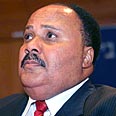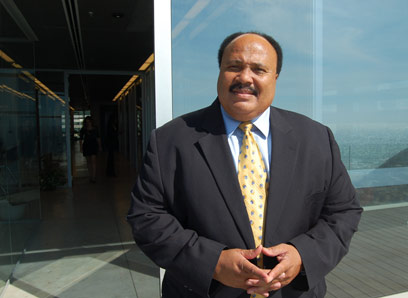
Martin Luther King III. Racism in legal system
צילום: גיל יוחנן
Martin Luther King III: Refusing service important
Son of US legendary civil rights leader visits Israel, inspired to expound his doctrine on solving conflicts in non-violent ways. 'We had conscientious objectors in the US army as well,' he tells Ynet
Martin Luther King III – the son of the child of legendary US civil rights leader Martin Luther King, Jr. – continues to spread his father's heritage, decades after the latter led one of the most important civil rights battles in human history.
King is visiting Israel and the Palestinian Authority for a first conference on non-violent resistance as part of a solution to the Israeli-Palestinian conflict, and is meeting with leaders, activists and young people.
On Thursday, in an interview with Ynet at the Peres Center of Peace in the heart of Jaffa's Ajami neighborhood, King explained his naïve and optimistic doctrine, which states that civilians must take part in solving the Israeli-Palestinian conflict in non-violent ways, even if the government views protests and conscientious objectors as violent.

He has heard about the weekly rallies in the West Bank villages of Bilin and Naalin, which the Palestinians view as a non-violent protest while the army thinks otherwise. He has also visited the area, not during a rally, and finds similarities to a different time in history.
"In the days of the African-American Civil Rights Movement, the government would tell people not to be in a certain place, and they continued to protest non-violently. They were arrested and beaten, but the struggle created an opportunity for them to live and work. But the segregation ended eventually."
He also sees a similarity between the calls for a boycott against Israeli universities or products made in Israel and the actions of the movement led by his father several decades ago.
"I think different techniques should be used in accordance with the situation. What we did in the 1960s included such actions. Black people boycotted the buses, and the bus companied eventually gave in, after almost 40 days of struggle. In such times, when economy is everything, if people choose this type of resistance, there is power and success."
'You're strong enough? Refuse'
In the meantime, he tries to spread his doctrine in other places in the world. We teach and train people. In Sri Lanka, which was in a civil war for decades, we trained people who were involved in the war. The civilians there decided to end the war, but things must be done so that they don't return to it. We plan to teach this theory in Bosnia as well.
"People must be exposed to non-violent methods. They must adopt is as a way of life. My father and other people acted this way, but even then there were those who wanted to act violently, those who believed in the 'eye for an eye and a tooth for a tooth' saying.
"Had we acted that way," he says, "people would not have had any eyes or teeth. So we must find a better way. I think we still have a long way to go, understanding and adopting non-violent struggles. There is a certain stage when one must leave the fears behind and move forward."
He has an answer to the claims that young people in Israel have no other choice but to join the Israel Defense Forces. "Once we had compulsory service in the United States as well, and there were conscientious objectors," he says.
"It's a non-violent way to resist. There were some who were arrested, some who left, but their stand was clear: I am not taking part in the struggle. I think people can resist this way. There were few of them in the US as well, and most young people went to war. Let's say that out of 1,000 people, 995 will go. The mass won't do it, but it's an option. It requires a strong personality, a person who understands the ramifications of his actions. It's definitely an option."
He finds it interesting that as children, we have no limits. "When my father was a child he played with his neighbors' children, and after the age of 10 or 12, their parents forbade them to play together."
But what about a country like Israel, where Jewish and Arab children don't even study together? "It's not ideal, because you get a one-sided viewpoint. Children should study about other cultures and respect them. Children are naïve, and adults are the ones with very resolved viewpoints."
A commander can be a politician
The US already has a black president, but Martin Luther King III knows that African Americans still face difficult struggles. "The main issue for most black people, and for poor people in general, is the access to funding. Small businesses cannot get loans, and even when there were loans, before the crisis, black businesses were at the bottom of the list.
"There are health issues as well. Black people with no health insurance, and many of them are poor, suffering from serious health problems."
He notes that prisons in the US are still filled with black and Hispanic people. "Until we deal with racism in the legal system and with black people's financial problems, these issues will not be solved. No one is dealing with it today, and I think the president should handle these issues."
If the same president asks him to be an ambassador or a special envoy for a certain mission, King will not turn him down, although he somewhat tired of public life.
"I used to be in politics, and I don't see myself running for a public office again. This is way I am heading a non-profit organizations. But I think people are needed everywhere: In business, in the civil society, in organizations and in politics. I always encourage young people: If you're old enough to be soldiers and even command entire squadrons, you can run for a public office. You can lead a community, an organization. I always encourage people to participate in politics."










